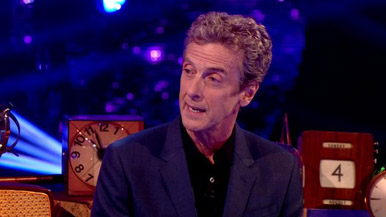Dr. Who Recap: And the 12th Doctor Is...
By Edwin Davies
August 5, 2013
2013 was already set to be a pretty momentous year for Doctor Who considering that it marked the 50th anniversary of the series. Then in June, news broke that Matt Smith, who had played the 11th incarnation of the Time Lord since 2010, would be stepping down, and that the anniversary would also see a new actor taking on the role as the show entered its sixth decade.
After months of speculation, word began to filter through that the bookies' favorite was the Scottish actor Peter Capaldi, an Oscar-winner best known for his performance as the foul-mouthed spin doctor Malcolm Tucker in The Thick of It and its big-screen spin-off, In The Loop. Despite the secrecy that surrounded the announcement - supposedly as few as ten people knew that Capaldi has landed the role - the bookies turned out to be bang on the money, and when number 11 bows out, either in the forthcoming anniversary special or the annual Christmas special, he will be replaced by Capaldi's wiry frame. But what does it mean for The Doctor to regenerate, and why is it such an important event?
Regeneration was not originally built into the character of The Doctor, but like much of the mythology of the show, came about as a matter of necessity. In 1966, as the show was quickly establishing itself as one of the BBC's more popular shows, William Hartnell, who played the First Doctor, was forced to leave the role due to his worsening health. Rather than cancel the show, the producers settled on a novel idea; since The Doctor is an alien, why can't he just "die" then come back as another person? When Hartnell's Doctor collapsed at the end of The Tenth Planet serial and transformed into Patrick Troughton, it not only allowed the show to continue in the immediate aftermath of Hartnell's departure, but set the stage for it to become a show that would impact multiple generations of viewers.
Not only does regeneration allow The Doctor to replenish his reserves every couple of years and slip into something more comfortable, but it also allows Doctor Who as a show to shake things up. This has become much more pronounced in recent years - just think about the marked difference in tone between the David Tennant years, which could often be downright wacky, and the more whimsical one that has defined Matt Smith's tenure - but even in the early days of the show, a change in who was piloting the TARDIS would have a major impact on the nature of the show itself.
Each new actor was able to put their own stamp on the character, one which would both serve as a means of distinguishing themselves from their predecessors while maintaining continuity so that people don't feel like their Doctor was somehow "wrong." Unlike, say, the cinematic versions of James Bond, all of which are very slight variations on a very specific character, each iteration of The Doctor is different from the one that came before it. They each have a firmly established sense of right and wrong, but each actor fundamentally differs on how to express that. Hartnell's Doctor was a sprightly, impish, grandfatherly type with a Victorian demeanor, whereas Troughton's was a sort of intergalactic hobo; Tom Baker's was almost perpetually delighted by each adventure, while Christopher Eccleston's seemed to dread them. The core concept remains the same, but the execution can vary wildly, and seeing an actor like Capaldi, who has a very different energy to Smith, take over could have a very strong and immediate impact on the show.
Continued:
1
2




